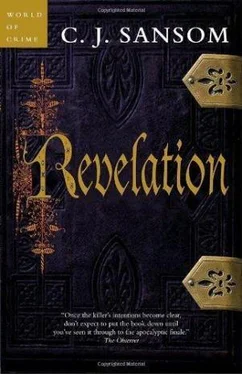Several things struck me. The first was that Strodyr was not a man of status and power like de Rais, but a farm labourer. There was no evidence of obvious signs of madness — the reporter said that he was a cheerful, friendly young man who worked on the local farms. Apart from that the report was silent on details about Strodyr — he was sentenced to hang, but if he had said anything from the dock it was not recorded.
I put the book down and sat thinking. So Guy was right, there had been cases of apparently pointless mass murder before. In this case the murderer had been caught. But Strodyr's ordinary back' ground and the fact that no one seemed to think him strange only stressed the difficulties we faced in finding our killer. And in a city the size of London, perhaps ten times the size of Norwich then, how much harder to find a single man. I thought again of the murderous child I had encountered a few years before; if he had lived would he have been another Strodyr, another de Rais? I could see no way to tell.
I WENT BACK to chambers and worked for a while. I jumped when the door opened and Barak came in. He looked tired and smelled of sweat, but was smiling.
'I have the addresses,' he said. 'And some news.'
I threw down my quill. 'On a Sunday?'
'I went down to Augmentations this morning. There were a lot of clerks there, trying to sort out the mess this reorganization has made. I managed to chivvy them into getting the Westminster records. I got the addresses and a register of payments with them.'
'Well done.' Yet I thought it sad that he should choose to work on Sunday, when he might be at home with Tamasin.
He sat down opposite me. 'The infirmarian himself has not been in to collect his pension since December. Just before the first murder, the cottar. His name is Goddard, Lancelot Goddard.'
'Did you get his address?'
'Yes. It is a poor street near the Steelyard. I've been down there—‘
'You did not try to see him by yourself—'
'Of course I didn't,' he said impatiently. 'I asked around the neighbours. They said there had been an ex-monk that rented a house there since Westminster Abbey went down three years ago. He kept apart from the locals, thought he was a cut above the shopkeepers and the like who live there. He left in January, saying he had inherited a house from his mother. I went to the place where he used to live; it's boarded up. Then I went to see the landlord; he's in the next street. He said the monk was a good tenant, quiet and always paid on time. He confirmed the story of the inheritance, said the monk came to tell him he was going, left the landlord with a month's rent in hand.'
'What did this Goddard look like?'
'A man nearing forty. Distinctive. High cheekbones and a big mole on the side of his nose. Tall and well set up, dark hair.'
'What about his assistants?'
'I got their addresses. One, Cantrell, lives in Westminster still, the other out near the old Charterhouse. At a tavern, called the Green Man.'
'A tavern.' I raised my eyebrows.
'So it seems. That's Lockley, the lay brother.'
I nodded. As he was not a monk, he would not have got a pension. But a tavern was a far cry from a monastery.
'What do you think has happened to Goddard? It is strange he vanished in January. Do you think—'
'That he could be the killer? Hold on, Jack, there could be another reason he disappeared.' I looked at him seriously. 'He could be another victim.'
Barak shook his head. 'Sounds like he deliberately vanished. Failed to leave an address.'
'I must send a note to Harsnet. You did well,' I added. 'I will tell him.'
He leaned back in his chair. 'I needed to do something,' he said. 'To find something — something—'
'Something real? Amidst all this inexplicable horror?'
'Yes.'
'Well, you have found it.' I looked at his face, tired and anxious still. I would not tell him of Guy's theory or my studies, not yet, not tonight. 'You should go home, you look as if you have had enough for one day.'
'Ay.' He looked guilty. 'I told Tamasin I'd be back for lunch. I'd best go.'
I shook my head after he had gone. If I were his age and Tamasin my wife, I would not be spending sunday afternoon harassing clerks in grubby archives. I turned my thoughts to Westminster Abbey. I remembered it had been one of the last monasteries to be dissolved. The King had not wanted the buildings destroyed as they housed the tombs of his father and other royal ancestors; he had squared the circle by turning the abbey into a cathedral. The former abbot had been installed as dean; he was known as one of Cromwell's agents inside the monasteries, working for its closure. His appointment afterwards had caused much cynical laughter.
I penned a long note to Harsnet and took it to the porter's lodge, telling him to have it delivered urgently. I looked out at Chancery Lane, the few passers-by, remembering the strong sense of being followed I had had earlier. As I returned I saw old Elias walking rapidly towards me; Dorothy was back. I walked with him back across Gatehouse Court, past the fountain, to Dorothy's, determinedly trying to clear my head of thoughts of Strodyr, of the other murderers. But with Roger perhaps the victim of such a man, that was not easy.
THE MAID MARGARET let me in. Dorothy was sitting in her usual place before the fire, beneath the wooden frieze, still dressed in black. I was glad to see she was occupied, embroidering a dress with little flowers. She looked up with a smile, and I was glad to see a little colour in her cheeks.
'How are you?' I asked gently.
'Life must go on, must it not; The clock still measures out the hours, even with Roger gone.'
'Yes, it does.'
'Samuel is coming tomorrow. And I have arranged Roger's funeral for Tuesday.' She looked at me. 'A week today since he died.'
'I know.'
'I am trying to keep occupied. With embroidery, as you see. And I have supervised the preparation of a fine repast. To thank you, for all you have done.'
'It is little enough, Dorothy. I am sorry commitments do not allow me to take on any of Roger's cases. But Bartlett has brought me a list of lawyers who can, and they are all honest fellows.'
'Good. I shall need the money. The Treasurer came to see me today, full of sorrow for my loss, but hinting they will be appointing a new Inn member now and he will want these rooms.'
'Have you enough to take a house? If not, I can—' She raised a hand. 'No. Thank you, Matthew, but Roger was a prudent man, there is enough saved for me to live carefully. But I do not know where I shall go. Samuel suggested in his letter that I return to Bristol.'
'Will you go?' I found my heart sinking at the thought. She hesitated. 'I do not know, yet. Is there any news?'
'We are making progress. I'm afraid that is all I can say.'
'Do you know yet why Roger was killed?' Her voice was no more than a whisper.
'No. But Dorothy . . .' I paused. 'We know of three men this man has killed now. All the victims of some terrible ritual. While he is at large, I think — I think you should not go out alone.'
'You think I might be in danger,' she said quietly.
'No. Only — it's as well to be safe.' Dorothy looked at me intently for a moment, then nodded. I felt suddenly fired anew with anger at what had been done to her and Roger.
A serving man appeared, bearing a large tray of meat with sweet- smelling sauces. I followed Dorothy to the table.
'There,' she said. 'A saddle of lamb. I am glad Lent is over. They say they are arresting butchers who sold meat then.'
'Yes.'
'I did not go to church today. I confess I cannot find it in my heart to feel anything but anger towards a God who could allow such an evil thing to happen to such a good man.' She looked at me. 'Do you think that a wicked thing?'
Читать дальше












